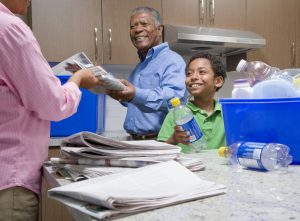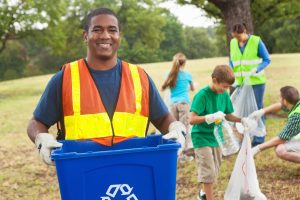Some common questions posed by recycling communicators across the state of Florida.
Do recycling messages work?
Yes. Our research shows that being exposed to any kind of recycling message increases peoples’ confidence in their ability to recycle and their feelings of being adequately informed about recycling. Getting messages about recycling out in front of people really is important!
Should I always focus on the environment when developing a recycling message?
Not necessarily. The environment can be a highly politically-charged issue, which can make some people tune out. When developing your messages, we recommend you use other benefits of recycling like the high cost of trash removal, reducing clutter around the house, saving energy, creating jobs, benefiting future generations, etc.
Is it a good idea to create different recycling messages depending on peoples’ ages?
Yes. We found that younger people (18 to 25 years of age) are less confident than older people about what items can be recycled. Compared to older people, they also felt that recycling messages weren’t as encouraging and didn’t do as good a job of explaining recycling. By developing friendly, easy-to-understand, step-by-step educational messages for younger adults, you might help increase their confidence in recycling.
Should I only use the Internet to distribute recycling messages?
No. While the Internet is a popular place to find information, it’s not the only one. Many people use other sources to learn about recycling, like county solid waste departments, the local newspaper, word of mouth, waste haulers, etc. To get the message(s) out, we recommend you find a variety of different ways to reach as many people as possible, both online and off.
Does income make a difference?
Yes. We found that people respond differently to different recycling messages depending on their incomes. In general, people with higher incomes ($100,000 or more) find messaging about how, why and what to recycle to be more effective than people with lower incomes ($10,000 or less). This implies that it might take more frequent messaging to be effective among people who have lower incomes.
Does education make a difference?
Yes. People with a four-year college degree felt that they understood recycling messages explaining what to recycle better than those with a high school degree or a GED certificate. People also have different mindsets depending on their education. People with a high school degree think of themselves as less environmentally-conscious than college graduates. Simple, easy-to-follow instructions can work for both groups while making sure you also give clear reasons for recycling to those who may not have a college education.
Is there a difference between urban and rural areas?
Yes. Compared to people living in rural areas, urban residents felt that recycling messages can effectively explain what items to recycle better than people living in rural areas feel they can and that they don’t need to be reminded as often. This means you might need to message more often to people living outside cities.
Is there a difference between recycling at home compared to away from home?
Yes, somewhat. In general, people think that recycling is easy but they think that recycling away from home is a little more challenging. Messages that include a tip about how to recycle away from home can help increase recycling rates.
Do children make a difference?
Yes. Overall, we found that parents react more favorably towards recycling messages and felt that messages explained how to recycle, what to recycle, why one should recycle better than people without children. Likewise, parents felt that recycling messages would encourage them to recycle more than those without children.
What are the biggest barriers that Floridians report about recycling?
Overall, majority of Floridians reported that they simply forget to recycle. That might mean that a simple reminder can just be enough. That said, finding ways to send out frequent reminders can help increase the overall recycling rate. Additional barriers include not having enough room to store items in their household, and lack of knowledge in recycling locations.
What about my county?
For more information about your county, please visit our Interactive Map!


